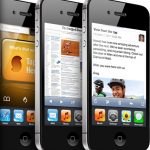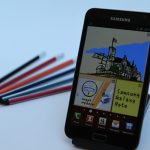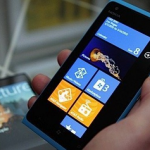iPhone is unstoppable

Now there's a headline I never expected to write, particularly following "Android is unstoppable" nine months ago. But in the United States, at least, iPhone has nearly matched pace with Androids. Looks like the Apple apologists will get their day. After years of wrongly boasting iPhone's leadership over Androids, they might yet be right.
For the three months ending in February, 48 percent of Americans who recently bought a smartphone, chose Android -- 43 percent iPhone, according to Nielsen. Those numbers are up considerably for both, but iPhone surged to close the gap, following the release of the 4S in October. A year ago, 27 percent of new acquirers chose Android versus 10 percent for iPhone.
Face.com: You can't stay 29 forever

Are you 35 and claiming to be 29? Don't post photos to Facebook. Today Face.com added a new attribute to its facial-detection API: age detection. The startup claims the new attribute will let developers create apps that use three criteria -- minimum, maximum and estimated age -- to determine how old people are in photos.
While the technology surely will appeal to social networkers, the big boon could be marketers looking to maximize exposure to select demographic groups, such as 18-24 year olds. Developers can set the attribute to look for specific age segments, hence the marketing potential. But there are others, such as detecting fake IDs at establishments serving alcoholic beverages. Additionally, Face.com claims to have improved facial recognition by 30 percent in this release of the API.
Got Ice Cream Sandwich? Get Google Maps 6.5 for Android now

Google isn't waiting for the install base of Android users to move to Ice Cream Sandwich, not that carriers or handset manufacturers help much (if you're waiting for that upgrade from Gingerbread, you know what I mean). Today the search and information giant updated Google Maps for Android to version 6.5, packing in capabilities specific to version 4.x. Don't you feel cheated? I would.
Google offers the best to a minority of users, and small is too big a word to describe them. According to Google's official stats, as of March 5, Ice Cream Sandwich accounts for a mere 1.6 percent of Android devices. But, hey, many of these users are the bleeding edge of influencers Google should want to reach -- and keep enthusiastic.
Who bought 5 million Galaxy Notes, because I want to know

Today's big Samsung Galaxy Note announcement -- 5 million shipped in five months -- has me wondering "Who?" Is it you?
It's a big number for an over-sized smartphone, under-sized tablet measuring 146.85 x 82.95 x 9.65 mm, weighing 178 grams and packing beastly 5.29-inch display. On Dec. 29, 2011, Samsung announced shipment of 1 million Galaxy Notes. Just weeks ago Samsung put shipments at 2 million. That's a helluva jump in just three weeks.
'This summer, when hunger strikes, and all hope seems lost, a small device will change your destiny' -- the VIP Fridge Magnet

Pack my bags, I'm moving to Dubai.
Local shop Red Tomato Pizza promises to make available a fridge magnet that you tap to place orders. For all I know, it's all gimmick. The promotional YouTube video is a smart production. Spoiler: You will want to order pizza after watching it.
Google, there's no good 'without doing evil'

When will someone stand up to the bully in the room? He roves around in intimidating manner boasting how kind he is. Hey, he can make friends without being evil. But bully is anything but good. That's how I feel about Google this fine Spring day.
Yesterday, "Google Play", the renamed Android Market, popped up on the black bar adorning my Google search page, with a beaconing red -- or is it orange -- "New". The service is now front and center with other Google services hawked from search, spotlighting an ongoing trend of aggressive integration that has rapidly accelerated under Larry Page's leadership. Microsoft spent nearly a decade under house arrest for doing less.
Will you buy Nokia Lumia 900 Windows Phone for $99? [poll]

If you feel like I've asked this question before, absolutely. Just without the price. Now that AT&T has announced availability -- and more importantly, pricing -- I ask again. Will you buy the Lumia 900?
AT&T starts taking pre-orders on March 30, with the phone available in stores on April 8. Available colors are cyan, magenta and black, or you can wait until April 22 for white. Oh my. Decisions, decisions. Lumia 900 is one hotly anticipated Windows Phone and marks Nokia's biggest push into the US market in years. There's LTE, too, something your haughty, obnoxious iPhone friends don't have. So will you buy? Please answer in comments (with color choice, please) and take our poll.
Nokia and Microsoft save face by investing 18 million Euros in Finnish apps dev project

Nokia has shown a score of developers the door since announcing its Windows Phone distribution deal in February 2011. Surely you remember the 2,300 Symbian developers off-loaded to Accenture? Is it cheaper to invest in new ones than keep the old? I ask because of today's Microsoft-Nokia announcement: Each will invest up to 9 million to fund AppCampus at Aalto University, in Finland.
The program is designed to help generate applications for Windows Phone and, get this, Symbian! Someone slap me aside the head and explain why Nokia doesn't just capitalize on the experience of existing Symbian developers. Easy answer: Both platforms need more third-party apps, and Nokia CEO Stephen Elop must make a desperate show of face, given his brutal axing of employees and ripping the Finnish heart out of Nokia's management culture.
Intel rises to the cloud

Cloud computing presents both challenges and opportunities for personal computing giants. Microsoft is "re-imagining" Windows for cloud-connected devices. Meanwhile, Intel rethinks its microprocessor strategies for mobile devices and servers, seeking to embrace the cloud at both ends of the consumption supply chain. For these incumbents that defined the personal computing era, the post-PC era future requires leaping from the past, not clinging to it.
Where the "Wintel" marriage is likely to remain strongest is the server. Microsoft's post-PC -- what I call cloud-connected device -- strategy is two-fold: Providing direct, hosted services or applications businesses can host internally and expanding Windows' support for additional chip architectures. For its part, Intel develops microprocessors for more device categories, while optimizing server chips for cloud applications and services, such as the recently announced Xeon processor E5-2600 product family.
App developers should adopt the Moore-is-less principle

Programmer Chris Boss has contributed some intriguing BetaNews commentaries and analyses about the state of application development and also Windows 8. Some readers call him old-fashioned, for his views on developing software. I disagree. Chris is new-fashioned, and this old dog could teach you young pups some new tricks.
I don't refer to developer tools but Chris' philosophy -- that applications should be lightweight rather than bloated. He contends that some of the tools commonly used today encourage bloat. I'm not knowledgeable enough there to make a case for or against anything. But I can comment on trends that demand less bloat and well-written apps that consume less disk space yet are powerful.
AT&T blames FCC for T-Mobile layoffs

You'd never know that the execs over at AT&T are bitter about the failed T-Mobile USA merger or paying out $3 billion for absolutely nothing.
Yesterday, T-Mobile handed out 1,900 pink slips, mostly to employees working in call centers. Gee, that's not a vital area, now is it? Today, AT&T rallies to T-Mobile's defense, blaming not the nation's fourth-largest carrier but the Federal Communications Commission. AT&T's rationale: The carrier would have preserved those jobs if allowed to buy T-Mobile.
Has an employer asked for your Facebook password?

It's a serious question, following today's stunning privacy post from Facebook. Has an employer or prospective one asked you for your Facebook password, or that of another social media site; could be Google+, Tumblr or Twitter, among others?
The request might have come as condition of continued employment, and there threat of reprisal might seem, or even be, real given the current job market. Or perhaps a prospective employer said that you couldn't be considered for a new position without first giving up your password. Please answer in comments. This is one of those rare occasions I don't mind, and even recommend, anonymous commenting if answer is "Yes". There also is a poll. Please answer, and you can choose multiple responses.
New iPad is now available in 35 countries

Today, Apple released new iPad in 25 more countries, bringing the total to 35 plus one US territory since sales started one week ago. What a week, too.
Sales over the three-day launch weekend reached 3 million units. After initially positive reviews, the knocks started in droves. Consumer Reports' tests found new iPad to be quite hot, as much as 116 degrees F, setting off a web maelstrom of blogs, news stories and social media posts. CR plans to release a more formal, and final, examination as early as today. Other complaints claim the supplied charger is inadequate for new iPad's giant battery. BetaNews hasn't found the tablet to be too hot or to charge too slowly. But tongues will wag.
5 things you should know about new iPad

Has less than one week passed since new iPad starting selling in 10 countries and one US territory? It seems like longer. Tomorrow, Apple's tablet will be available in 25 more. With more people set to buy new iPad, which sold 3 million units over the three-day launch weekend, time is right to discuss things you should know before plunking down your hard-earned cash.
There is suddenly lots of confusion about new iPad, with all these conflicting media reports -- blogs and news sites running praising reviews alongside stories about yet another fatal design flaw. You just don't know who to believe. Perhaps these five things will help you find clarity.
Are hacktivists more dangerous, or just more determined?

As if Anonymous didn't have enough to boast about. While cybercriminals accounted for the most breaches, "activist groups created their fair share of misery and mayhem last year as well -- and they stole more data than any other group", according to a report Verizon released today in cooperation with Australian, Dutch, English, Irish and US officials. The study attributes 58 percent of data thefts to hacktivists.
"The most significant change we saw in 2011 was the rise of 'hacktivism' against larger organizations worldwide", Verizon reports. "The frequency and regularity of cases tied to activist groups that came through our doors in 2011 exceeded the number worked in all previous years combined".
Joe's Bio
Joe Wilcox is BetaNews executive editor. His motto: Change the rules. Joe is a former CNET News staff writer, JupiterResearch senior analyst, and Ziff Davis Enterprise Microsoft Watch editor.
Ethics StatementBetaNews, your source for breaking tech news, reviews, and in-depth reporting since 1998.
© 1998-2025 BetaNews, Inc. All Rights Reserved. About Us - Privacy Policy - Cookie Policy - Sitemap.
